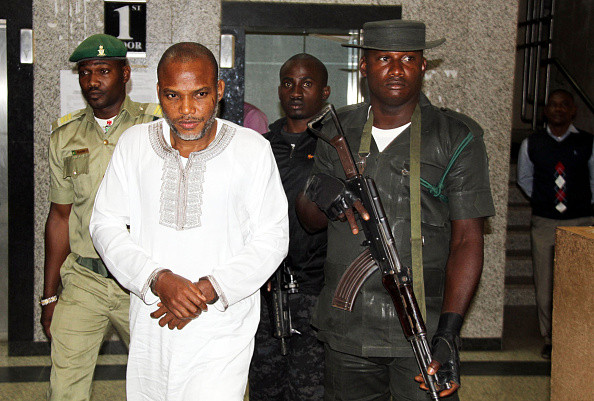Nnamdi Kanu: Ipob leader in court as defence appeals against witness anonymity

A pro-Biafran leader accused of treason has appeared in court contrary to an earlier statement by his lawyer that he would not attend the hearing on 9 March. Barrister Ifeanyi Ejiofor, one of the lawyers representing Nnamdi Kanu, confirmed to IBTimes UK his client had been present in court.
Kanu, Radio Biafra director and head of the Indigenous People of Biafra (Ipob), is standing trial on six counts of treasonable felony charges. At a previous hearing on 7 March, Hon. Justice John Tsoho ruled against Kanu's request for charges against him to be dropped but allowed witnesses to testify behind protective screens, as requested by the prosecution.
However, the defence opposed the ruling. "We filed an application in court today and appealed against an earlier ruling given by the court that witnesses can testify behind screens," Ejiofor said. "We filed the application today and they are to reply."
After the prosecution said it opposed the motion filed by the defence, Tsoho adjourned the matter to 5 April.
Pro-Biafrans are calling for the independence of the Biafran territories forcibly annexed to Nigeria during British colonisation, which ended in 1960. They hold regular marches across the country's south-east demanding independence. A Biafran Republic was established in 1967 and re-annexed to Nigeria in 1970, following a civil war that claimed between one and three million lives.
Kanu's detention 'unlawful'
Kanu was arrested by the DSS in Lagos in October 2015 on conspiracy and terrorism charges, which were later dropped.
A day after the Abuja High Court ruled he should be released, officials pressed new treasonable felony charges against him, while President Buhari said Kanu would not be granted bail due to the "atrocities" allegedly committed.
Kanu had been kept in DSS custody until Tsoho ruled he should be transferred to the Nigeria Prison Service in Kuje, about 40km south-west of Abuja, the capital, so relatives could visit him.
Meanwhile, Amnesty International told IBTimes UK that Kanu's earlier detention had been unlawful. Lucy Freeman, senior research adviser at Amnesty, said: "We have seen in several cases the practice of the DSS of arresting someone, holding them unlawfully, and when that person challenges their detention with bail, they are immediately charged with something else to prolong their detention. That's unlawful detention," Freeman said.
"There are a number of people who have been detained in connection to Boko Haram who had a similar thing happened. The question is: To what extent is the rule of law respected? By looking at the examples of Kanu and other cases it seems that it is not being respected."
© Copyright IBTimes 2025. All rights reserved.






















